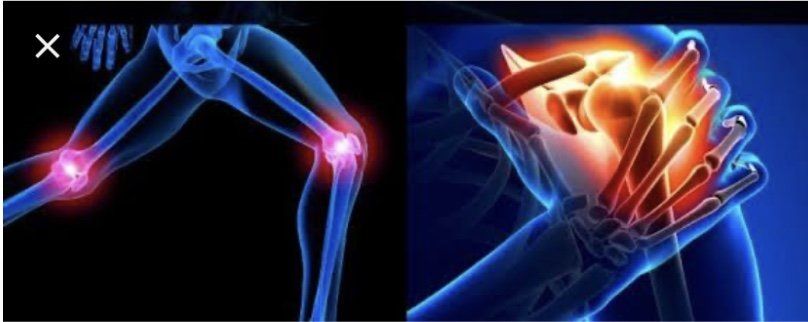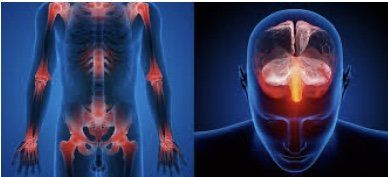What is an inflammation?
Inflammation is part of the body’s defense mechanism and plays a role in the healing process.
When the body detects an intruder, it launches a biological response to try to remove it.
The attacker could be a foreign body, such as a thorn, an irritant, or a pathogen. Pathogens include bacteria, viruses, and other organisms, which cause infections.
Sometimes, the body mistakenly perceives its own cells or tissues as harmful. This reaction can lead to autoimmune diseases, such as type 1 diabetes.
Experts believe inflammation may contribute to a wide range of chronic diseases. Examples of these are metabolic syndrome, which includes type 2 diabetes, heart disease, and obesity.
People with these conditions often have higher levels of inflammatory markers in their bodies.
In this article, find out more about why inflammation happens, its symptoms, and ways to resolve it.
Diseases or medical conditions that cause inflammation often have a name ending in “-itis.” For example:
• Cystitis: an inflammation of the bladder
• Bronchitis: an inflammation of the bronchi
• Otitis media: an inflammation of the middle ear
• Dermatitis: a disease where the skin is inflamed
There are two main types of inflammation: acute and chronic.
Acute inflammation
An injury or illness can involve acute, or short-term, inflammation.
There are five key signs of acute inflammation:
• Pain: This may occur continuously or only when a person touches the affected area.
• Redness: This happens because of an increase in the blood supply to the capillaries in the area.
• Loss of function: There may be difficulty moving a joint, breathing, sensing smell, and so on.
• Swelling: A condition call edema can develop if fluid builds up.
• Heat: Increased blood flow may leave the affected area warm to the touch.
These signs are not always present. Sometimes inflammation is “silent,” without symptoms. A person may also feel tired, generally unwell, and have a fever.
Symptoms of acute inflammation last a few days. Subacute inflammation lasts 2–6 weeks.
Chronic inflammation can continue for months or years. It either has or may have links to various diseases, such as:
• diabetes
• cardiovascular disease (CVD)
• arthritis and other joint diseases
• allergies
• chronic obstructive pulmonary disease (COPD)
• psoriasis
• rheumatoid arthritis
The symptoms will depend on the disease, but they may include pain and fatigue.
Acute inflammation can result from:
• exposure to a substance, such as a bee sting or dust
• an injury
• an infection
When the body detects damage or pathogens, the immune system triggers a number of reactions:
• Tissues accumulate plasma proteins, leading to a buildup of fluid that results in swelling.
• The body releases neutrophils, a type of white blood cell, or leukocyte, which move toward the affected area. Leukocytes contain molecules that can help fight pathogens.
• Small blood vessels enlarge to enable leukocytes and plasma proteins to reach the injury site more easily.
Signs of acute inflammation can appear within hours or days, depending on the cause. In some cases, they can rapidly become severe. How they develop and how long they last will depend on the cause, which part of the body they affect, and individual factors.
Some factors and infections that can lead to acute inflammation include:
• acute bronchitis, appendicitis and other illnesses ending in “-itis”
• an ingrown toenail
• a sore throat from a cold or flu
• physical trauma or wound
Chronic inflammation
Chronic inflammation can develop if a person has:
Sensitivity:
Inflammation happens when the body senses something that should not be there. Hypersensitivity to an external trigger can result in an allergy.
Exposure:
Sometimes, long-term, low-level exposure to an irritant, such as an industrial chemical, can result in chronic inflammation.
Autoimmune disorders:
The immune system mistakenly attacks normal healthy tissue, as in psoriasis.
Autoinflammatory diseases:
A genetic factor affects the way the immune system works, as in Behçet’s disease.
Persistent acute inflammation:
In some cases, a person may not fully recover from acute inflammation. Sometimes, this can lead to chronic inflammation.
Factors that may increase the risk of chronic inflammation include:
• older age
• obesity
• a diet that is rich in unhealthful fats and added sugar
• smoking
• low sex hormones
• stress
• sleep problems
Long-term diseases that doctors associate with inflammation include:
• asthma
• chronic peptic ulcer
• tuberculosis
• rheumatoid arthritis
• periodontitis
• ulcerative colitis and Crohn’s disease
• sinusitis
• active hepatitis
Inflammation plays a vital role in healing, but chronic inflammation may increase the risk of various diseases, including some cancers, rheumatoid arthritis, atherosclerosis, periodontitis, and hay fever.
Is inflammation painful?
Acute inflammation can cause pain of varying types and severity. Pain may be constant and steady, throbbing and pulsating, stabbing, or pinching.
Pain results when the buildup of fluid leads to swelling, and the swollen tissues push against sensitive nerve endings.
Other biochemical processes also occur during inflammation. They affect how nerves behave, and this can contribute to pain.
What happens when you have an inflammation?
When an inflammation occurs in your body, many different immune system cells may be involved. They release various substances, known as inflammatory mediators. These include the hormones bradykinin and histamine. They cause the small blood vessels in the tissue to become wider (dilate), allowing more blood to reach the injured tissue. For this reason, inflamed areas turn red and feel hot.
The increased blood flow also allows more immune system cells to be carried to the injured tissue, where they help with the healing process. What’s more, both of these hormones irritate nerves and cause pain signals to be sent to the brain. This has a protective function: If the inflammation hurts, you tend to protect the affected part of the body.
The inflammatory mediators have yet another function: They make it easier for immune system cells to pass out of the small blood vessels, so that more of them can enter the affected tissue. The immune system cells also cause more fluid to enter the inflamed tissue, which is why it often swells up. The swelling goes down again after a while, when this fluid is transported out of the tissue.
Mucous membranes also release more fluid when they are inflamed. For instance, this happens when you have a stuffy nose and the membranes lining your nose are inflamed. Then the extra fluid can help to quickly flush the viruses out of your body.
Signs of an inflammation
There are five symptoms that may be signs of an acute inflammation:
• Redness
• Heat
• Swelling
• Pain
• Loss of function
When a wound swells up, turns red and hurts, it may be a sign of inflammation. Very generally speaking, inflammation is the body’s immune system’s response to an irritant. The irritant might be a germ, but it could also be a foreign object, such as a splinter in your finger.
This means that an inflammation does not only start when, for instance, a wound has already been infected by bacteria, is oozing pus or healing poorly. It already starts when the body is trying to fight against the harmful irritant.
Examples of a loss of function include not being able to move an inflamed joint properly, having a worse sense of smell during a cold, or finding it more difficult to breathe when you have bronchitis.
Inflammations don’t always cause all five symptoms. Some inflammations occur “silently” and don’t cause any symptoms.
General responses in the body
If the inflammation is severe, it can cause general reactions in the body. These may include the following signs and symptoms:
• Generally feeling ill, exhaustion and fever. These are signs that the immune system is very active and needs a lot of energy, which may be lacking for other activities. If the rate of metabolism is higher due to a fever, more antibodies and cells of the immune system can be produced.
• Changes in the blood, such as an increased number of immune system cells.
A very rare but dangerous complication of an infection is called septicemia (blood poisoning). The possible signs of this complication include chills, feeling very ill, and a very high fever.
Septicemia may occur if bacteria multiply quickly in a certain part of the body and then a lot of them suddenly enter the bloodstream. This can happen if the body isn’t able to fight the infection locally, if the germs are very aggressive, or if the immune system is very weak. Septicemia is a medical emergency and needs to be treated by a doctor as soon as possible.
Inflammations can cause chronic diseases too
Inflammations don’t always help the body. In some diseases the immune system fights against the body’s own cells by mistake, causing harmful inflammations. These include, for example:
• Rheumatoid arthritis, where many joints throughout the body are permanently inflamed
• Psoriasis – a chronic skin disease
• Inflammatory bowel diseases like Crohn’s disease or ulcerative colitis
Collectively known as chronic inflammatory diseases, these diseases can last for years or even a lifetime. Their severity and level of activity varies.
Causes of an inflammation
Many different things can cause inflammations. These are the most common:
• Pathogens (germs) like bacteria, viruses or fungi
• External injuries like scrapes or damage through foreign objects (for example a thorn in your finger)
• Effects of chemicals or radiation
10 Causes of Inflammation
The immune system triggers inflammation in reaction to injury or infection. In this regard, it is a healthy part of natural recovery from an illness or injury. When inflammation develops for this reason, it indicates a correctly functioning system, but signs of inflammation that do not go away, or develop without a legitimate trigger, signify that the immune system is not working properly. The causes of chronic inflammation differ from person to person.
1. Digestive Troubles
Excessive alcohol consumption, GI tract conditions, certain medications, and vomiting can cause gastritis or inflammation of the stomach. Sometimes, gastritis becomes a chronic condition that damages the stomach lining. It is important to see a doctor and find out what is causing the symptoms. Depending on the cause, a doctor may recommend stopping medications that irritate the digestive tract and avoiding alcohol and smoking. They may also recommend dietary changes or medications.
2. Emotional Stress
Studies show psychological stress interferes with the body's ability to control inflammation, which heightens the risk of disease. Emotional stress triggers the production of cortisol, the flight-or-flight stress hormone that plays a role in inflammation. Excess cortisol also increases one's risk of contracting an infection. Many people make this connection themselves, noting they are more likely to develop a cold or other minor infection when stressed than when mentally healthy.
3. Physical Stress
Chronic physical stress can also result in excessive inflammation. For example, excessive exercise, such as running a marathon or going without sleep for a few days places substantial stress on the body and can trigger inflammation. However, regular exercise in moderation has an anti-inflammatory effect and may help keep inflammation in check.
4. Insulin Resistance
Insulin resistance occurs when cells cannot take up glucose as efficiently as they should. This common health problem is linked to a higher risk of developing type 2 diabetes. Insulin resistance is more common in people who are overweight or obese, and it sometimes has a genetic component. Some studies link insulin resistance with chronic, low-grade inflammation, although more research is needed to clarify this link.
5. Hormone Imbalance
Inflammation could be a byproduct of an imbalance of hormones such as estrogen, progesterone, and testosterone. Imbalance in these hormones can alter the level of cortisol, a hormone that helps keep the immune system balanced and inflammation in check. Chronic inflammation can affect women going through menopause, causing symptoms such as adult acne and osteoporosis. Studies suggest that inflammation naturally increases with age and may be a factor in many of the chronic health problems people develop later in life.
6. Synthetic Fibers
Fibers in plastics, latex, and other products can trigger inflammation in people who are sensitive to these fibers. Often, the inflammation will be seen and felt on the skin in the area into which the product came into contact. For instance, if one reacts to latex gloves, they may notice inflammation, a rash, and other signs of irritation on their hands and wrists. Some people are allergic to latex and can experience a life-threatening reaction if exposed to it in any form. Other people are not allergic to latex but develop skin irritation and inflammation when they come into contact with it. A portion of people who have skin irritation eventually develop an allergy.
7. Poor Diet
Diet plays a role in inflammation. Studies suggest that refined carbohydrates, foods made with white flour, processed meats, and sugar are linked with inflammation. In contrast, preliminary research finds other foods, including fruits, vegetables, nuts, olive oil, and fish are associated with reduced inflammation. This is one more reason to skip the junk food and choose more whole, unprocessed fare.
8. Food Allergies
Food allergies and inflammation are both overreactions of the immune system, but they differ in some respects. The symptoms of food allergies are brought about by IgE antibodies that form from previous exposure to an allergen. Allergies often show up early in life, although adults can develop them too. They often have a genetic component and are more likely to run in families. Nuts, fish, and milk are common allergens, and in some, contact or ingestion can cause a life-threatening reaction. But people can also be sensitive to certain foods or dietary components without having a true allergy. For example, people with Celiac disease mount an immune response to gluten and develop inflammation as a result, though this is not a true food allergy. A doctor or nutritionist can help patients determine to which foods they are allergic through allergy tests and elimination diets.
9. Chemicals
Chemicals are another common cause of inflammation, and people may come into contact with them either through the air, ingestion, or topically. The ingredients in some personal care and cleaning products can be absorbed and cause reactions either on or beneath the skin. The signs of skin inflammation include redness, itching, tenderness, and swelling. The medical term for skin inflammation is dermatitis. Even mild exposure to workplace chemicals or cleaning products can cause inflammation, as can pollutants in the air.
10. Trigger Foods
Although food allergies are more severe than food triggers, even people without allergies can react negatively to eating certain foods. Products high in linoleic acid -- found in safflower, corn, soy, and sunflower -- can prompt an inflammatory reaction, according to some research. In some cases, diets high in refined carbohydrates and highly processed foods trigger inflammation. In contrast, healthy, fiber-rich carbohydrate sources, like fruits and vegetables, may reduce inflammation. As with full-blown allergies, skin tests and dietary restrictions can help doctors diagnose, and people control, these intolerances.
10 Potential Causes of Chronic Inflammation
You may have a general idea of what inflammation feels or looks like when you experience it. But do you understand why a given body part gets inflamed or swollen in the first place? Inflammation occurs as part of the body's response to harmful stimuli with the purpose of eliminating whatever is causing cell injury. If the condition causing acute inflammation does not get resolved, chronic inflammation may ensue, resulting in much physical discomfort for the suffering individual. When you understand the potential causes of chronic inflammation, you may be able to help prevent its onset.
1. Obesity
Obesity is time and again linked with low-grade, chronic inflammation. When fat cells start to expand, you get fatter, leaving your body in a constantly swollen state. Your body doesn't like this extra stress, so white blood cells rush to help. Unfortunately, if you do not lose weight soon enough, healthy cells stop responding to the hormone that regulates blood sugar, and then the body may suffer from something a lot more dangerous than inflammation: diabetes. White blood cells that were there to help you now enter the bloodstream and start damaging your liver.
2. Stress And Anxiety
Sudden and unexpected unpleasant situations can cause stress and high anxiety. Emotional stress in the form of night sweats or a panic attack usually signals cortisol-prompted inflammation. Cortisol is a hormone that dilates the blood vessels when a threat is perceived. Inflammation spreads even faster when under stress because even if you do not feel any physical pain, your brain detects that your change in emotions and causes inflammation as a by-product of trying to protect you.
3. Pollution And Bad Air
Chronic inhalation of bad air has been associated with increased morbidity from ischemic cardiovascular events. Living in a polluted area means a higher chance of developing diabetes because bad air causes inflammation. Moreover, cigarette smoking exposes your lung function and airways to bad air, leaving the immune system to try to repair itself constantly, without any success.
4. Overeating
Red meat and sugar are very hard for the body to digest. It takes hours of hard work and a lot of stomach acid to properly deal with such meals. Inflammation can result if you don't eat foods your body can process more easily, such as fruits, vegetables, legumes, nuts, and seeds.
5. Lack of Sleep
If you have insomnia, your body secretes inflammatory cytokines at a higher rate than those who do not experience insomnia. During sleep, the body regenerates, and the immune system calms down. Lack of restorative sleep is a major promoter of inflammation. People with rheumatoid arthritis or other autoimmune disorders experience this when lack of sleep due to pain associated with their condition promotes further flare-ups and more pain.
6. Food Allergies
Certain food can trigger allergies. For example, some people are allergic to casein, found in milk, or to gluten, found in wheat. If these ingredients cause an inflammatory response when you ingest them. The only thing you can do is avoid them. Some foods, including sunflower oils, soy or peanuts, can cause inflammation to anyone if used excessively.
7. Hormones
Imbalance of hormones — estrogen, progesterone, and testosterone — may cause inflammation. Menopausal women often gain weight quickly and become prone to conditions such as acne and osteoporosis, which is characterized by fragile bones, due to lack of calcium, because they often experience inflammation as their hormone balance shifts with age.
8. Clothing Fibers
Believe it or not, choosing your clothes carefully might be one of the biggest favors you could do for yourself. Some people who have especially sensitive skin may find problematic fibers can cause rashes, nausea, itching and in more extreme situations, even lung problems as a result of the inflammation they cause.
9. Chemicals
You're exposed to dozens of chemicals in your everyday life, from air fresheners, adhesives, cosmetics, and cleaning products to glues, heavy metals, and pesticides. A common cause of inflammation comes from the airborne irritants that we breathe in at work. If the air conditioning system in your home or workplace is not clean, everything spreads even faster.
10. Excessive Alcohol
Anything more than one drink a day is considered excessive, damaging your memory, reasoning, thinking, and teeth, and sometimes resulting in gastritis, which can lead to anemia and malnutrition. Combining alcohol with tobacco is an even worse decision, leading to esophagitis, or inflammation of the tube that carries food from mouth to stomach.
Does sugar cause inflammation in the body?
People with diets rich in refined sugar may be increasing their risk of chronic inflammation. Research suggests that when people eat and drink less sugar, inflammatory markers in their blood decrease.
A high sugar diet can have harmful effects on health, such as increasing the risk of chronic diseases, weight gain, and tooth decay. It can also result in chronic inflammation, where the body’s immune system activates, resulting in damage to healthy cells.
Inflammation resulting from lifestyle factors, such as obesity, smoking, and a sedentary existence can contribute to a range of diseases. These include heart disease, diabetes, rheumatoid arthritis, and Alzheimer’s.
Natural ways to reduce inflammation
Studies have shown that eating less sugar can reduce inflammation, so people should aim to limit their sugar intake. The World Health Organization (WHO) strongly recommend a maximum sugar intake of less than 10% of daily energy intake.
Eating only 5% of daily calories from sugar may have added health benefits, the WHO say. For someone eating 2,000 calories per day, the maximum from sugar would be 100 to 200.
Ways to reduce inflammation in the body include:
• Getting enough sleep. Improving sleep hygiene and getting better sleep may decrease the risk of developing chronic inflammation.
• Quitting smoking. Smoking is a risk factor for many chronic diseases, including chronic inflammation.
• Following an anti-inflammatory diet. Read about foods that reduce inflammation here.
• Maintaining a healthful weight. Obesity is another risk factor for chronic inflammation. Excess fat tissue may increase inflammatory factors. The most effective strategy for reducing chronic inflammation is weight loss.
• Trying supplements. Read about supplements that could help with inflammation here.
Sex hormones, such as estrogen and testosterone, can slow down the production of inflammatory factors. For some people, testing and correcting hormonal imbalances could reduce chronic inflammation.
Thank you for your support in reading this article and hopefully, you may have found it beneficial.
"Providing Better Health Through Knowledge"













